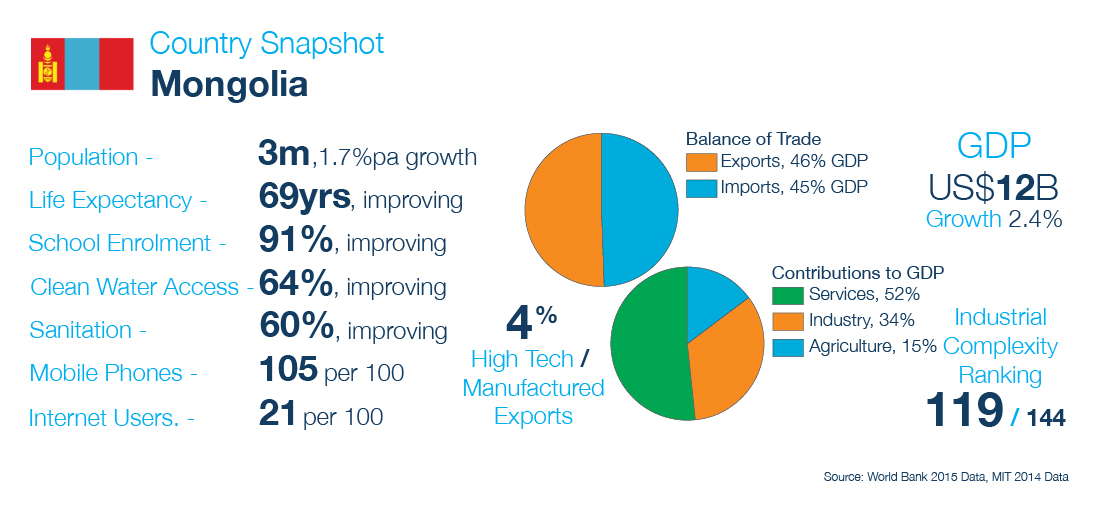Mongolia

The Mongols gained fame in the 13th century when under Chinggis Khaan when they established a huge Eurasian empire through conquest. After the death of Chinggis Khaan the empire was divided into several powerful Mongol states, but these broke apart in the 14th century. The Mongols eventually retired to their original steppe homelands and in the late 17th century came under Chinese rule.
Mongolia won its independence in 1921 with Soviet backing and a communist regime was installed in 1924. The modern country of Mongolia, however, represents only part of the Mongols' historical homeland; today, more ethnic Mongolians live in the Inner Mongolia Autonomous Region in the People's Republic of China than in Mongolia. Following a peaceful democratic revolution in 1990, the ex-communist Mongolian People's Revolutionary Party (MPRP) - which took the name Mongolian People’s Party (MPP) in 2010 - has competed for political power with the Democratic Party (DP), the main opposition party, and several other smaller parties, including a new party formed by former President Enkhbayare, which confusingly adopted for itself the MPRP name. In its most recent Parliamentary elections in June 2016, Mongolians handed back to the Mongolian People’s Party overwhelming control of Parliament, largely pushing out the DP, which had overseen a sharp decline in Mongolia’s economy during its control of Parliament in the preceding years.
Mongolia is a semi presidential republic with Ulaanbaatar as its capital. Presidential candidates are nominated by political parties represented in the State Great Hural (parliament), they are directly elected by simple majority popular vote for a 4-year term (eligible for a second term). Following legislative elections, the leader of the majority party or majority coalition is usually elected prime minister by the State Great Hural. State Great Hural or Ulsyn Ikh Khural in a unicameral chamber (one chamber) with 76 seats. All members are directly elected in multi-seat constituencies by simple majority vote and serve 4-year terms. The cabinet is nominated by the prime minister in consultation with the president, and confirmed by the State Great Hural. The civil law system influenced by Soviet and Romano-Germanic legal systems, the constitution ambiguous on judicial review of legislative acts.
The mainstay of Mongolia’s recent growth has been Foreign Direct Investment (FDI) in Mongolia's extractive industries ,which are based on extensive deposits of copper, gold, coal, molybdenum, fluorspar, uranium, tin, and tungsten. FDI has transformed Mongolia's landlocked economy from its traditional dependence on herding and agriculture and exports now account for more than half of GDP. Mongolia depends on China for more than 60% of its external trade - China receives about 90% of Mongolia's exports and supplies Mongolia with more than one-third of its imports. Mongolia also relies on Russia for 90% of its energy supplies, leaving it vulnerable to price increases. Remittances from Mongolians working abroad, particularly in South Korea, are significant.
Mongolian growth averaged nearly 9% per year in 2004-08 largely because of high copper prices globally and new gold production. By late 2008, Mongolia was hit by the global financial crisis and Mongolia's real economy contracted 1.3% in 2009. In October 2009, Mongolia passed long-awaited legislation on an investment agreement to develop the Oyu Tolgoi (OT) mine, among the world's largest untapped copper-gold deposits. However, a dispute with foreign investors developing OT called into question the attractiveness of Mongolia as a destination for foreign investment. This caused a severe drop in FDI, and a slowing economy, leading to the dismissal of Prime Minister ALTANKHUYAG in November 2014. The economy had grown more than 10% per year between 2011 and 2013 - largely on the strength of commodity exports and high government spending - before slowing to 7.8% in 2014 and 2.3% in 2015. In May 2015 an agreement with Rio Tinto to restart the OT mine and the subsequent $4.4 billion finance package signing in December 2015 served to increase investor confidence. The current government has made restoring investor trust and reviving the economy its top priority.
Source: US CIA ‘The World Fact Book’.
